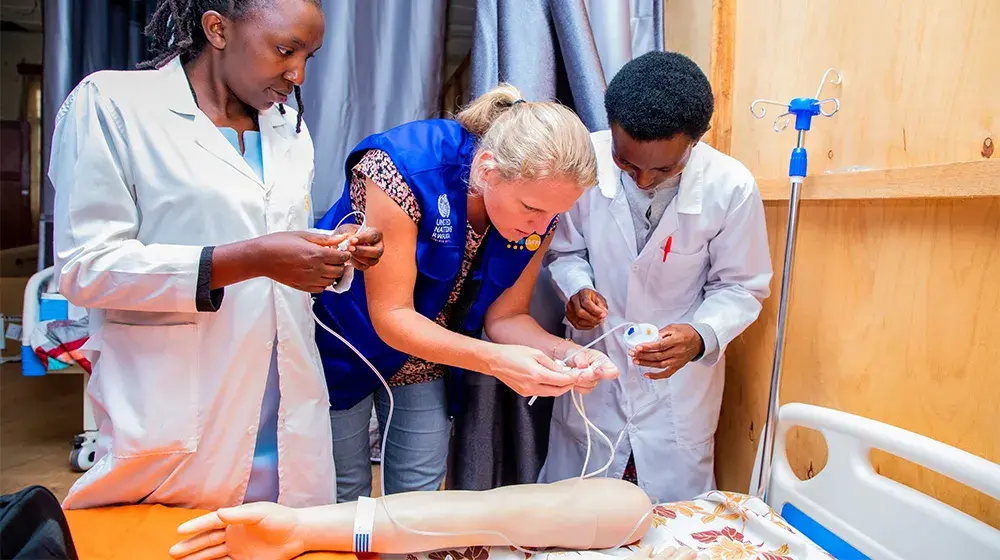While celebrating World Population Day, the United Nations Population Fund (UNFPA) called for more efforts in the provision of sexual and reproductive health information and services.
Celebrated on July 11 of every year, World Population Day is a moment to raise awareness on population and development issues around the world. This year’s commemoration comes during the COVID-19 pandemic that may have lasting consequences on the population.
The COVID-19 pandemic has exposed weaknesses in health care systems globally and has caused serious gaps and challenges in the provision of sexual and reproductive health information and services. Additionally, the reallocation of resources away from these services is taking a toll on the health of women and girls. This year, the UNFPA is calling to prioritize the reproductive health and rights of all people, including ease of access to information and services.
“Sexual and reproductive health services are essential,” said UNFPA Executive Director Dr. Natalia Kanem adding, “Health systems should be supported to deliver sexual and reproductive health services during crises, including by classifying this work as essential”.
A woman, who has control over her body gains not only in terms of autonomy but also through advances in health and education, income and safety, is more likely to thrive, and so is her family. As the United Nations sexual and reproductive health Agency, UNFPA helps people obtain contraception and life-saving reproductive health services as well as information to empower women and girls to make informed decisions about their bodies and lives.
“What leads to healthy and productive societies is when women can make informed choices about their sexual and reproductive health, and when they have access to services to support their choices,” said Mr Mark Bryan Schreiner, UNFPA Rwanda Representative.
Compounded economic impacts of the pandemic have been felt especially by women and girls, who generally earn less, hold less secure jobs and face a greater risk of losing their livelihoods or descending into poverty. The Government of Rwanda has done a great job in creating conditions for individuals to access SRH information and services, and choose the number of children they want, even in the context of COVID-19.
“UNFPA wishes to express its gratitude to the Government of Rwanda for its Nairobi Summit commitments to accelerate access to sexual and reproductive health and rights for all. Rwanda continues to make tremendous progress in implementing the commitments through innovative, high impact health programmes to improve lives, particularly for women and girls,” said Mr. Schreiner in a statement.
Family planning
At the Nairobi Summit in 2019, Rwanda committed to reducing the unmet need for family planning through improving further service delivery, access and uptake by increasing the number of health facilities, skilled healthcare providers and by expanding the available contraceptive method mix, including emergency contraceptives.
Key progress includes decreased Unmet Need for Family Planning from 19% in 2015 to 14% in 2020; and teenage pregnancy reduced from 7,3% in 2015 to 5,2% in 2020, despite the pandemic.
“Old and new challenges have emerged that could hamper our progress. A lot of progress has been made since the original ICPD, including significant improvements in maternal health and expanded access to voluntary family planning as highlighted in the dissemination of DHS IV 2020 key indicators report.” Said Hon. Dr. Daniel Ngamije, Minister of Health at a high level multi-sectoral stakeholders meeting organized in December 2020 by the Ministry of Health in collaboration with UNFPA to disseminate the Rwanda ICPD25 Commitments
“The key drivers of the progress made so far include visionary leadership, community participation, commitment, citizens’ hard work and support from development partners.” Hon. Dr. Ngamije added.
Rwanda is among the countries that were able to maintain or restore access to essential health services, including family planning.
Rwanda’s current population is approx. 11.8 million, of which around 70 percent is youth with 27.6 percent between the ages of 16 and 30. The total fertility rate (TFR) is 4.1 children.
Results from 2019-2020 Demographic and Health Survey (DHS 2019-2020) show that 5 percent of women aged 15-19 have begun childbearing and this rises rapidly with age from less than 1 percent at the age of 15, to 15 percent at the age of 19 adding that teenagers with no education and those in the lowest wealth quintile tend to start childbearing earlier than other teenagers.
While the UNFPA-supported Rapid Assessment on the Continuation of RMNCAH Services (2020) revealed minimal disruption to SRH services during the pandemic, there remains a need for continued advocacy and awareness-raising to ensure that SRH remains central to essential health services during the Covid-19 pandemic and any other crisis.
Call for addressing gender inequalities
The covid-19 pandemic has also heightened existing inequalities and exposed socio-economic gaps in societies. It has exacerbated gender inequities and gender-based violence, with an increased incidence of violence under lockdowns.
Addressing Gender-Based Violence and teenage pregnancy remain among the top priorities of the Government of Rwanda and Development Partners.
The 2020 Rapid Gender Assessment (RGA) on the Impact of Covid-19 on Women and Men in Rwanda reaffirmed the importance of effective response to gender inequalities.
The study shows that during the pandemic, women are the most affected in their economic activities as their businesses have been the most affected compared to men due to Covid-19 thus having a drastic reduction in household basic expenditures.
The study outlines the key policy recommendations on how Rwanda can best address the gender differentiated impacts. These include the acceleration of women empowerment programs and expansion of social protection measures along with increased access to IT and eradication of any form of gender-based violence.




